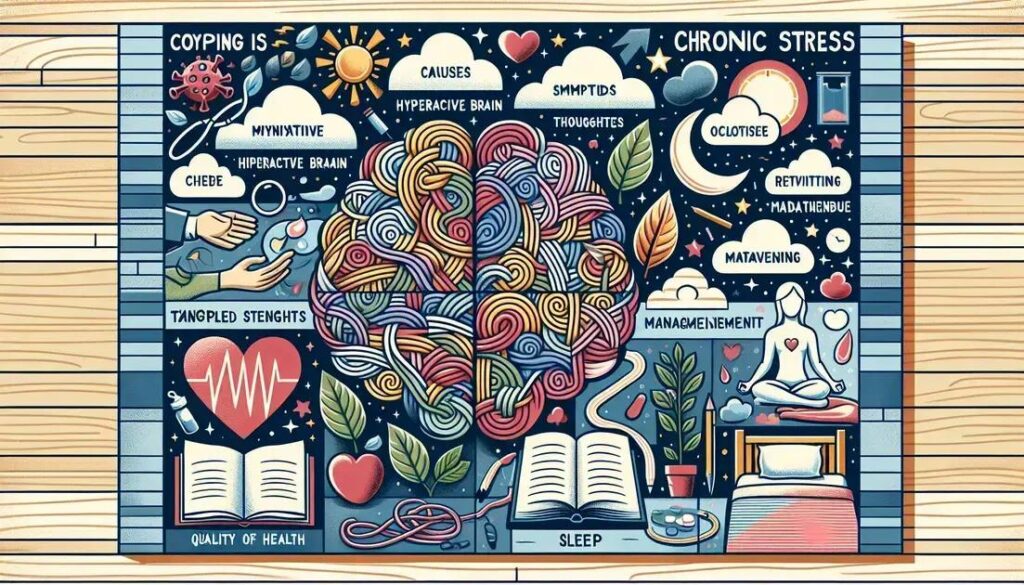Are you tired of feeling like you’re constantly running on a hamster wheel, with no end in sight? Chronic stress is a silent killer that can creep up on you without warning, affecting every aspect of your life.
In this article, we’ll explore the causes and symptoms of chronic stress, its devastating impact on mental and physical health, and most importantly, effective techniques and strategies to manage it.
So, let’s dive in and take the first step towards reclaiming your life.
Causes and Symptoms of Chronic Stress
Chronic stress is a pervasive issue that can manifest in various ways, from physical symptoms like headaches and fatigue to mental health concerns such as anxiety and depression. The causes of chronic stress are often complex and multi-factorial, including work-related pressures, personal relationships, financial concerns, and lack of social support.
Common symptoms of chronic stress include increased heart rate, blood pressure, and cortisol levels, as well as changes in appetite and sleep patterns. If left unmanaged, chronic stress can have severe effects on both mental and physical health, increasing the risk of chronic diseases like hypertension, diabetes, and cardiovascular disease. It is essential to recognize the warning signs of chronic stress and take proactive steps to manage it before it takes a toll on overall well-being.
The Impact of Chronic Stress on Mental and Physical Health
The consequences of chronic stress on mental and physical health are far-reaching and devastating. Chronic stress can lead to a range of mental health issues, including anxiety disorders, depression, and post-traumatic stress disorder (PTSD). Additionally, chronic stress can exacerbate existing mental health conditions, making it essential to manage stress effectively. Physically, chronic stress can cause a range of symptoms, including headaches, fatigue, and muscle tension. Furthermore, chronic stress can increase the risk of chronic diseases, such as hypertension, diabetes, and cardiovascular disease. It is crucial to understand the impact of chronic stress on overall health and well-being, as this knowledge can inform effective stress-management strategies.
Managing Chronic Stress: Effective Techniques and Strategies
Managing chronic stress requires a multifaceted approach that incorporates both short-term and long-term strategies. Effective techniques include mindfulness meditation, deep breathing exercises, and physical activity, such as yoga or walking.
Additionally, cognitive-behavioral therapy (CBT) and relaxation techniques, such as progressive muscle relaxation, can help individuals develop healthier coping mechanisms.
It is also essential to prioritize self-care, including getting regular exercise, eating a balanced diet, and engaging in activities that bring joy and relaxation.
By incorporating these stress-management strategies into daily life, individuals can reduce the impact of chronic stress on mental and physical health.
The Role of Self-Care in Reducing Chronic Stress
Self-care is a vital component of managing chronic stress, as it allows individuals to prioritize their own needs and well-being.
Key self-care practices include setting realistic boundaries, engaging in activities that bring joy and relaxation, and seeking social support from loved ones or mental health professionals.
Additionally, self-care involves taking care of physical health, including getting regular exercise, eating a balanced diet, and getting sufficient sleep.
By prioritizing self-care, individuals can develop resilience and better cope with the demands of daily life, reducing the impact of chronic stress on mental and physical health.
The Importance of Sleep in Managing Chronic Stress
Sleep plays a critical role in managing chronic stress, as it allows the body to recover and recharge.
During sleep, the body repairs and regenerates tissues, builds bone and muscle, and strengthens the immune system.
Additionally, sleep helps to regulate stress hormones, such as cortisol, and can improve mood and cognitive function.
Individuals struggling with chronic stress should prioritize sleep by establishing a consistent sleep schedule, avoiding stimulating activities before bedtime, and creating a relaxing sleep environment.
By doing so, individuals can improve their overall quality of life and better manage the symptoms of chronic stress.
Conclusion: Taking Control of Chronic Stress
Taking control of chronic stress requires a comprehensive approach that incorporates both short-term and long-term strategies.
By recognizing the causes and symptoms of chronic stress, managing stress through effective techniques and self-care practices, and prioritizing sleep and overall well-being, individuals can reduce the impact of chronic stress on mental and physical health.
It is essential to be proactive and take steps to manage chronic stress, rather than waiting until it becomes a major issue.
By doing so, individuals can improve their overall quality of life and maintain a healthy balance between mental and physical well-being.
Frequently Asked Questions about Chronic Stress
What are the common causes of chronic stress?
Chronic stress can be caused by a variety of factors, including work-related pressures, personal relationships, financial concerns, and lack of social support.
What are the symptoms of chronic stress?
Common symptoms of chronic stress include headaches, fatigue, muscle tension, irritability, and difficulty sleeping.
How can I manage chronic stress?
Effective techniques for managing chronic stress include mindfulness meditation, deep breathing exercises, physical activity, cognitive-behavioral therapy, and self-care practices such as setting realistic boundaries and seeking social support.
What is the role of self-care in reducing chronic stress?
Self-care is essential for reducing chronic stress, as it allows individuals to prioritize their own needs and well-being. Key self-care practices include getting regular exercise, eating a balanced diet, and getting sufficient sleep.
Why is sleep important in managing chronic stress?
Sleep plays a critical role in managing chronic stress, as it allows the body to recover and recharge. During sleep, the body repairs and regenerates tissues, builds bone and muscle, and strengthens the immune system.
How can I take control of chronic stress?
Taking control of chronic stress requires a comprehensive approach that incorporates both short-term and long-term strategies. By recognizing the causes and symptoms of chronic stress, managing stress through effective techniques and self-care practices, and prioritizing sleep and overall well-being, individuals can reduce the impact of chronic stress on mental and physical health.



